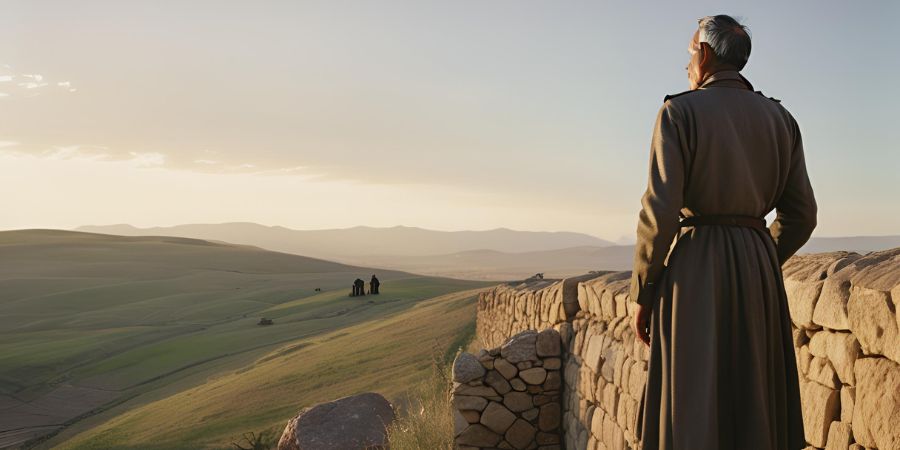The phrase “Watchmen on the Wall” carries deep spiritual and historical connotations. Rooted in biblical scripture, it paints the picture of a vigilant sentinel, tasked with protecting a community by standing guard, watching for danger, and sounding the alarm. For theologian John Calvin, this role embodies a profound spiritual responsibility—a call to vigilance, discernment, and unwavering dedication to God’s word.
Calvin, one of the key figures of the Protestant Reformation, viewed the “watchman” as both a protector of faith and a herald of truth. In this article, we will explore the biblical origins of the term, Calvin’s interpretation, and how his teachings apply to modern spiritual life.
The Biblical Foundation of the Watchman
1. Old Testament Origins
The imagery of the watchman originates from the Old Testament. In ancient times, watchmen stood on city walls, scanning the horizon for threats. Their role was critical for the survival of their communities, as they were the first line of defense against external dangers.
One of the clearest references comes from the Book of Ezekiel:
“Son of man, I have made you a watchman for the people of Israel; so hear the word I speak and give them warning from me.” – Ezekiel 3:17
Here, God appoints Ezekiel as a spiritual watchman, tasked with warning Israel of impending judgment. This role wasn’t merely about vigilance; it required moral courage and an unflinching commitment to deliver God’s message, even when it was unwelcome.
2. The Role of the Watchman in the New Testament
In the New Testament, the concept evolves. While physical watchmen guarded cities, spiritual watchmen were tasked with safeguarding the church. Jesus’ warnings about staying awake and being prepared for His return resonate with the watchman’s duty:
“Therefore keep watch, because you do not know on what day your Lord will come.” – Matthew 24:42
These passages emphasize readiness, spiritual awareness, and accountability—qualities Calvin deeply valued.
John Calvin’s Interpretation of the Watchman
1. Calvin’s Theological Framework
John Calvin viewed the role of the watchman as central to the mission of pastors and spiritual leaders. For Calvin, a watchman was more than just a guardian; they were shepherds of God’s flock, entrusted with teaching and preserving sound doctrine.
In Calvin’s commentary on Ezekiel, he explains:
“A watchman must not only observe diligently, but also cry aloud when danger appears, that the people may be warned.”
This highlights two essential aspects of the watchman’s role:
- Observation: Staying alert to spiritual threats, including false teachings and moral decay.
- Proclamation: Fearlessly proclaiming God’s truth, even when it’s uncomfortable or unpopular.
2. The Accountability of the Watchman
Calvin believed that spiritual leaders would be held accountable for their vigilance. Drawing from Ezekiel’s warnings, he taught that failing to sound the alarm—to confront sin or address false doctrine—was tantamount to neglecting one’s divine duty.
For Calvin, this wasn’t just a burden for clergy. Every believer had a role in upholding truth and living as a testimony to God’s righteousness.
Characteristics of a Faithful Watchman According to Calvin
1. Vigilance in Faith
A watchman’s first duty is vigilance. Calvin stressed the importance of staying rooted in Scripture and being attuned to spiritual dangers. This requires:
- Regular Study: Immersing oneself in the Bible to understand God’s will.
- Discernment: Identifying false teachings or worldly influences that threaten faith.
2. Boldness in Proclamation
Calvin admired the courage of biblical prophets who spoke truth in the face of opposition. He believed that a true watchman must:
- Speak with clarity and conviction.
- Prioritize God’s truth over human approval.
- Address sin and call for repentance without fear of backlash.
3. Compassionate Leadership
While the watchman’s role is to warn, it is also to guide. Calvin emphasized compassion and care for those under their charge, encouraging watchmen to:
- Lead by example, demonstrating Christ-like love.
- Offer encouragement and hope alongside warnings.
- Foster unity and spiritual growth within the community.
Applying Calvin’s Teachings Today
1. Watchmen in Modern Church Leadership
Today, pastors and church leaders are the spiritual watchmen of their congregations. Calvin’s principles remain relevant as they:
- Guard against false teachings.
- Address moral and social challenges with biblical wisdom.
- Encourage believers to remain steadfast in faith.
2. The Role of Lay Believers
Calvin’s vision of the watchman extends beyond clergy. Every believer is called to:
- Stay vigilant in their personal faith journey.
- Support and hold one another accountable.
- Serve as witnesses to God’s truth in their communities.
3. Facing Modern Challenges
The modern world presents unique challenges to faith, including secularism, moral relativism, and misinformation. Calvin’s teachings on vigilance and proclamation encourage believers to:
- Engage thoughtfully with culture while upholding biblical values.
- Use discernment when navigating media and information.
- Stand firm in truth while demonstrating Christ’s love.
Conclusion
Being a watchman on the wall, as Calvin envisioned, is a high calling that demands vigilance, courage, and compassion. Whether as a pastor guiding a congregation or a believer living faithfully in daily life, the principles of observation and proclamation remain timeless.
Calvin’s teachings remind us that the role of a watchman is not merely about guarding against threats but also about fostering a deeper connection to God and His word. As we strive to fulfill this role, we embody the essence of a watchman—standing firm in faith, warning of danger, and guiding others toward God’s truth.
